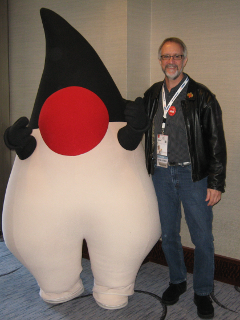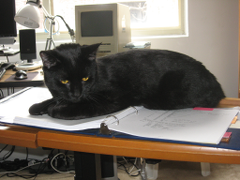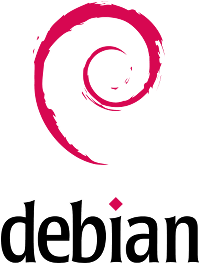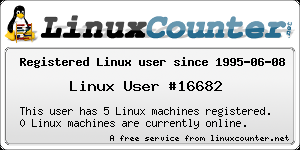

I'm Glenn Holmer, a retired Java programmer and Linux admin living on the fashionable Lower East Side in Milwaukee, Wisconsin, USA. We call our city "a great place on a Great Lake"; it's home to a beautiful art museum (interior) and The Domes (Mitchell Park Horticultural Conservatory). You can see a picture of my cat Wizard on the lower left; he lets me live in his condo. I'm on Mastodon: @Cenbe@techhub.social and I can be reached by email as cenbe at protonmail dot com. For the curious, the name "lyonlabs" comes from my first experiments with booting multiple operating systems in the early 90s: I had a machine with OS/2, Coherent Unix, and... well, something else, and I used to call my apartment "the Lyon Street labs" because that's where I lived at the time. "Cenbe" is a character in a 1946 science fiction story called Vintage Season; he is a time‑traveling multimedia artist.
In July 2024, I finally achieved my dream of travelling cross-country on an Amtrak sleeper train (Milwaukee to San Francisco and back). You can see pictures and videos at the link.
Here are some pictures from my travels to Yogyakarta in central Java (Indonesia); on the right you can see the obligatory tourist picture (taken before Jl Malioboro was rebuilt). Here's some video I shot on my 2005 trip, when a guy I met there invited me to his village outside Bantul to watch the local gamelan practicing; I've got a YouTube channel that also includes lots of videos taken at the Sultan's Palace and nDalem Pujokusuman dance school. On my most recent trips to the city of my dreams (2011, 2013, 2017), I stayed at Hotel 1001 Malam (1001 Nights Hotel)... and I hope to go back again. Don't miss this short video I shot of kopi joss being prepared at Angkringan Lek Man (watch all the way to the end)!
I've started a gaming page: I'm an old-school Dungeons & Dragons player (although these days I play Castles & Crusades), and the pages contain some con pictures, campaign summaries, and so forth. Let me know if you want to play.
I've been a Linux user since 1995. Here are the slides from a presentation I gave at the Milwaukee Linux Users Group (MLUG) in June 2014 about systemd. I buy all my PCs from System76, who specialize in hardware that runs Linux well... although I haven't had to buy a new one in some time because theirs are so reliable. My main workstation "greyhand" is their high-end liquid-cooled Leopard Extreme (now discontinued). I also have one of their discontinued "Wildebeest" models that I use as a test bed for exotic operating systems, and a smaller Ratel (also discontinued), which used to host this web site, but is now a Plan 9 server. I have two of their laptops: a Galago Pro [galp3] (which I reviewed at an MLUG meeting) and a beautiful new Lemur Pro [lemp13]. I highly recommend System76!
I've finally digitized my tapes of Sheboygan Bands from the 80s. Remember going to see The Boss, Alliance, Trinity, or EMF at the Downtowner? Well, you can relive those days again with pictures and MP3s of everyone's favorite bar bands!
When I was in high school, I went to a training camp for classical musicians called Symphony School of America. Later, I went to music school, where I studied the piano (my principal teacher was Robert Silverman). I performed a lot of 20th-century music, including works by Schönberg, Scriabin, Webern, Stockhausen and George Crumb; but I did not neglect Chopin. I am also a connoisseur of the great pianists of long ago like Koczalski, de Pachmann, Friedman, and Godowsky. Although I no longer play, I enjoy listening to later 20th-century music (especially Pierre Boulez) and have a good collection of scores, including Gruppen and Pli Selon Pli. On the other end of the spectrum, I have lots of recordings of the Ars Subtilior composers of the late 1300s. I got the Wagner bug in my early 30s and have suffered varying degrees of obsession with Tristan und Isolde and Parsifal. More recently, I've discovered a susceptibility to Mahler, especially the 6th, 7th, and 9th symphonies (all of which I've heard the Chicago Symphony play).
I'm a
Commodore 64 elder, having
used and programmed these now-historic computers for almost 40
years. This is the machine that made me a programmer; learning 6502
assembly language made it possible for me to learn IBM 370 assembler
at work, which led to all the strange and wonderful things I coded
later. I used to give talks at vintage computer shows
about programming
languages and operating systems for the Commodore 64, but the
retro scene has become mostly YouTubers and x86 wannabes, so it's no
more fun. Click the "chickenhead" logo for software, pictures of my
machines and of shows I've been to, and of course, lots and lots of
technical information.
I dabble in
classic Macintosh computers,
which is something I always wanted to learn about; there's something
so simple and elegant about the GUI of these machines. I've got two of
them (an SE and an SE/30, both running System 7), and have a fair
grasp of how the operating system is used. Both LocalTalk and
AppleTalk are working (with the participation of a Linux box acting as
a server), and TCP/IP using MacTCP as well (click the link for
details).
If you're ever near Silicon Valley, be sure to visit the Computer History Museum. They've got displays that will knock your socks off, from centuries-old slide rules to the underground behemoths that watched the skies during the Cold War. They've even got part of ENIAC, before which I knelt in reverence! For several years, they also had a reconstruction of Charles Babbage's Difference Engine, which was on loan from its owner Nathan Myhrvold. Here are pictures of the setup checklist, the machine in operation, and an operator with a debugger.
Here are some pictures of the museum from my latest visit in July 2024.



I've been a Linux user since 1995, starting with Slackware (ah, the joys of a well-customized fvwm). In 1998, I switched to SUSE (with KDE) after seeing it first at Atlanta Linux Expo '97 (demoed by Bodo Bauer), and then at Linux Expo '98 in Raleigh (I got Linus' autograph both times). At that time, I made Linux my primary operating system, replacing OS/2. In mid-2008, frustrated by the initial releases of KDE 4, I switched to Ubuntu and had a brief but passionate dalliance with GNOME 2. But I was shocked and horrified by the release of Ubuntu with the Unity interface, and switched to Kubuntu, which reunited me with my beloved KDE. Over time, though, I became increasingly concerned by Ubuntu's tendency to go their own way instead of working with the rest of the community. Ubuntu's decision to switch to systemd was almost enough to keep me, but creating Unity instead of working with the GNOME developers, their power struggles with the Kubuntu developers, creating the Mir project instead of using Wayland, their foolish ideas about convergence and more finally alienated me to the point of switching distros... for only the third time in twenty years. (Update 2017-04-05: Ubuntu has bailed on Unity and convergence, so I was right.) So in May 2015 I switched to the KDE spin of Fedora. (This proved to be an excellent decision where KDE 5 was concerned, as Fedora received fixes for some bugs months before Kubuntu did, and without a backport repository.) But wait, there's more: when I switched to Fedora, it was a tight choice between that and Debian, and I eventually came to the conclusion that Debian would really have been better for me. It's easier to use and has the benefit of an amazingly large repo. So on 2016-09-16, I became a full-time Debian user. And the journey's not over, as I switched from KDE to MATE (with Compiz and Emerald) in February 2021 due to compositor crashes in Plasma [update 2025/05: still lovin' Compiz!].
I've been a member of the Milwaukee Linux Users Group (MLUG) on and off for many years, and was at the first meeting back in the late 90s. On 2014-06-14, I gave a presentation on systemd, of which I am a strong supporter. To paraphrase Pierre Boulez' famous remark about serialism in music: "Any Linux user who has not experienced—I do not say understood, but, in all exactness, experienced—the necessity for systemd is USELESS. For his whole work is irrelevant to the needs of his epoch."